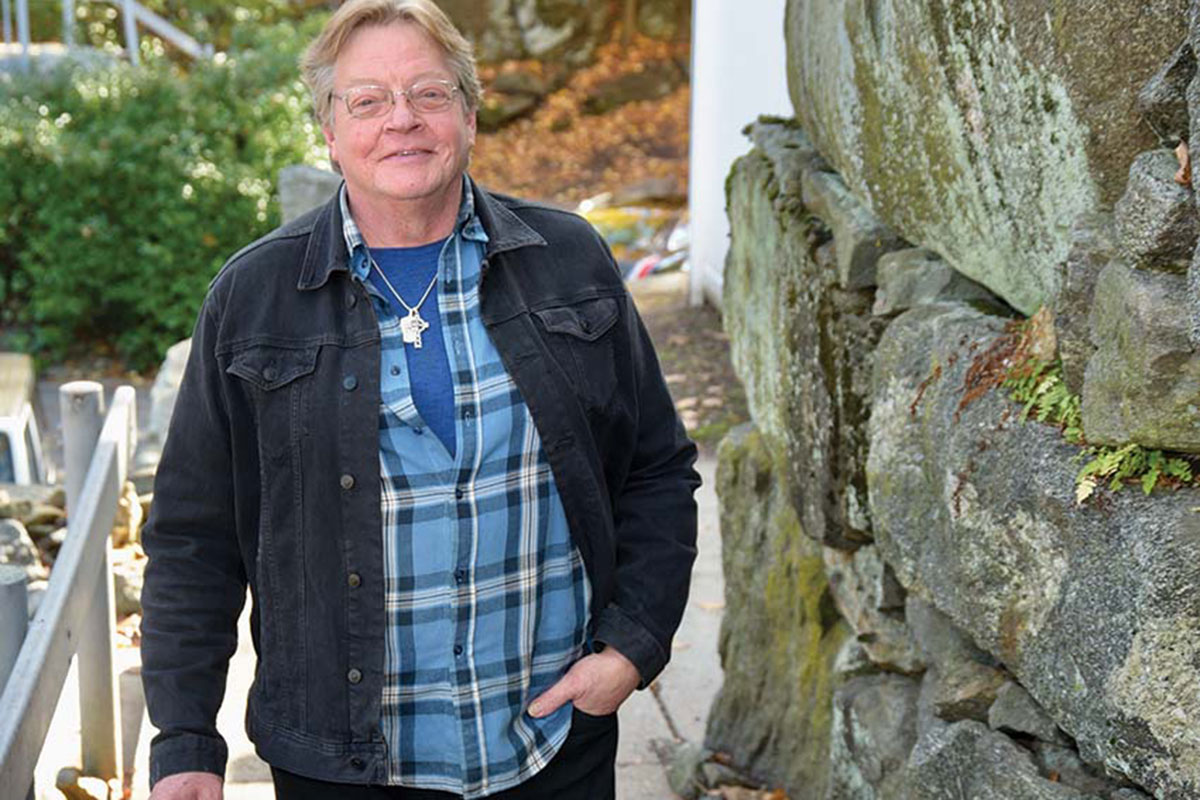“It’s taken a long time, but I finally like who I am and feel comfortable in my own skin,” said Keith O’Leary, 61, who has been sober for nearly three-and-a-half years.
That’s quite an accomplishment for O’Leary, who was living on the streets, in homeless shelters or in nursing homes. “In 2010, I lost everything – my job, my house, my car – and I don’t have family,” he said. “I was drinking the whole time.”
He was in and out of numerous detox, residential rehab and intense outpatient programs, but none of them were successful in curbing his alcohol addiction. In 2016 he moved in with a friend, who threatened to throw him out unless he went to Greenwich Hospital’s Addiction Recovery Center (ARC).
Today, O’Leary considers the center a place where he feels safe, understood and supported by staff and fellow patients. “It’s been my saving grace,” he said.
O’Leary is among the thousands of individuals who have confronted their addictions and sought treatment at the ARC. The outpatient, evidence-based services are designed to address the biological, psychological and behavioral elements of each patient’s disease, and include group, individual and family counseling, medication-assisted treatment and psychiatric therapy.
Initially founded as the Alcohol Recovery Center 40 years ago, the center’s current name reflects the growing prevalence of other substance use disorders (SUDs), including prescription opioids, heroin, cocaine, methamphetamines and sleep medications. In the meantime, advances and research in the field of addiction medicine have evolved, acknowledging addiction as a disease that can be treated with medications and cognitive therapy, in conjunction with group and individual counseling.
“The understanding and treatment of addiction have grown exponentially,” said Amir Garakani, MD, a board-certified psychiatrist and the medical director at the ARC. “Addiction is a disease that is tightly woven in with other psychiatric disorders, such as depression, anxiety and attention deficit disorder,” added Dr. Garakani, who is also chair of Psychiatry and Behavioral Health at Greenwich Hospital.
Greenwich Hospital’s ARC and similar programs nationwide also reflect a shift in societal attitudes toward alcohol and drug addiction. Until recent years, SUDs were considered a scourge confined to inner cities and communities of color. Addicts were demonized as junkies and often incarcerated under regressive “war on drugs” laws. Then, beginning in the 1990s, the opioid crisis afflicted white suburbs and rural areas.
“Sadly, it took high school students overdosing and dying or going into treatment for wealthy communities to realize their kids are shooting heroin,” Dr. Garakani said.
This realization, aside from removing the stigma associated with addiction, has led to decriminalization and legalization of some recreational drugs and an increase in multidisciplinary treatment facilities. Many states have adopted clean-needle exchange programs and expanded access to medications such as buprenorphine, which prevents opioid withdrawal symptoms, and naloxone, which rapidly reverses an opioid overdose.
Still, according to the Centers for Disease Control and Prevention, more than 96,000 drug overdose deaths were reported in the U.S. from March 2020 to March 2021. In Connecticut, there were 1,372 fatal drug overdoses in 2020, an increase of 14.3 percent from 2019. Fairfield County had the state’s lowest rate of drug-overdose deaths, at 22.3 percent per 100,000 residents.
High-quality outpatient care
While Greenwich Hospital does not have inpatient detoxification services, the ARC offers a three-tiered outpatient program headed by Dr. Garakani, who oversees a staff of specially trained alcohol and drug counselors, social workers and nurses. At the highest level of care is the intense outpatient (IOP) program, comprising day or evening group counseling sessions four days a week, three hours per session, for six weeks. When a patient is adequately stable, he or she can step down to a twice-a-week outpatient group, for as long as deemed necessary, then finally to a continuing care group that meets once a week.
ARC patients may be referred to practitioners from the hospital’s outpatient behavioral health program for additional services such as addiction-medicine management or individual psychotherapy, said program director Joshua Hrabosky, PsyD.
“With the evolution of mental health care and addiction-related issues, we now have new medications that employ substances once considered taboo, such as ketamine and psilocybin, to treat psychiatric conditions,” he said. “At the same time, we have seen a change in our culture that is more tolerant and compassionate toward people with addiction issues.”
“I’m a totally different person,” said Sarah, who has been sober for more than six years and still attends the ARC. Sarah was in her 20s when she started drinking, partying and abusing drugs – in particular, opioid painkillers.
“Everything just got out of control,” she said, including life at home with her parents and siblings, and relationships with friends and coworkers.
Sarah became addicted to alcohol and drugs, and more than once sought treatment at inpatient detoxification and rehabilitation centers. “But they didn’t do anything for me,” she admitted. “I guess I wasn’t ready.”
In 2015, Sarah finally was ready to focus on getting straight and was referred to the ARC. “I was hesitant at first, because nothing had previously helped,” Sarah recalled. “But as I continued going and got more involved in my treatment and more willing to listen to the counselors, it snowballed from there.”
It’s a family affair
Although personal accountability for their behavior and willingness to adhere to the program are central to a patient’s successful treatment, involving family members is also deemed critical. “I cannot overstate the importance of family involvement,” said Lakshmi Nair, a licensed alcohol and drug counselor at the ARC, which recommends individual therapy sessions with at least one designated family member attending.
“If the family’s relationship is not supportive, it can interfere with the patient’s ability to move forward in recovery,” Nair said. “And on the flip side, family members need support, too. All the attention is on the patient, good or bad, when using and in recovery. What’s lost is the family member’s voice, and we offer them a safe space to find that voice.”
One of the many adverse side effects of the COVID-19 pandemic has been an uptick in SUDs, usually related to loneliness, economic anxiety, fear of contagion and other stressors exacerbated during business and school closures and at-home lockdowns. Greenwich Hospital’s ARC pivoted when COVID-19 hit by providing patients remote counseling and therapy through telemedicine. “It has been a godsend for certain patients,” Dr. Garakani said, “for instance, those with anxiety or health issues that prevent them from leaving home.” Others, however, missed the face-to-face social interaction and were relieved when in-person sessions resumed.
“We are now at about 50-50 between telemedicine and in-person sessions,” Dr. Hrabosky said. “Some patients are still uncomfortable coming into a hospital setting, though others are so excited to be back with peers in group sessions.”
Count O’Leary and Sarah among the latter as they continue their respective recovery journeys.
“I’ve been with great groups of people who wanted to be here and took the program seriously,” said Sarah. “I’ve learned from experience that it’s better when you connect with people and support each other.” She’s also adopted better personal behaviors and coping skills. “Sobriety has led me back to a normal life and normal relationships.”
People have asked O’Leary when he’s going to quit the ARC, he said. “I don’t have any intention,” he tells them. “The staff has been there for me through all my issues, and the other patients have become my family.”




